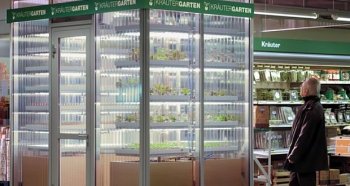
While large-scale vertical urban farms may not be viable everywhere, scaled-down versions of this space-efficient growing method have been shown to be a potential good choice for a green small business, and the introduction of a new micro-scale offering from INFARM could bring the crops right into the grocery aisle.
Introducing ‘farming as a service’, the company has launched what it calls "the first in-store farm in Europe" at a Berlin METRO supermarket location, with the mini-farm being dubbed simply ‘Kräuter Garten’ (herb garden). It looks like a tiny greenhouse inside the store, and shoppers can pick their own freshly harvested salad greens and herbs right from the growing plants.
The modular INFARM units don't have to just grow greens and herbs, however, and can be configured for different crops, such as tomatoes or peppers, and thanks to its vertical or stacked nature, which allows for more plants per square foot, it can fit into a relatively small footprint.
Considering the long journey that most fresh produce travels to the store, and the high level of spoilage/shrinkage/waste in retail produce departments, growing at least some of the food right on the sales floor might be a better all around option for both the store and the customers. These vertical micro-farms can also be envisioned as a natural fit for some restaurants, hotels, or retreat centres, where they can produce a little of their own local food, even on a small space.
Several years ago, INFARM launched itself as an indoor urban farming startup with an origami-inspired microgarden project on Indiegogo, and has now progressed to the point where the company feels confident in saying, "Our farms are a perfect synergy between hardware and software, creating far greater production efficiency than any other technology in the market."
According to Fast CoExist, the current INFARM pilot programme in Berlin has been operating for about six months, with another six months to run, and aims to start manufacturing other units by the end of the year.
No details were given about the cost of the units, but cofounder Guy Galonska related their business model to the razor blade model, "where we sell the technology at relatively low prices, and then provide all the supplies and additional services, like the software, for example."
Source: TreeHugger, via HortiBiz



 Classifieds
Classifieds

